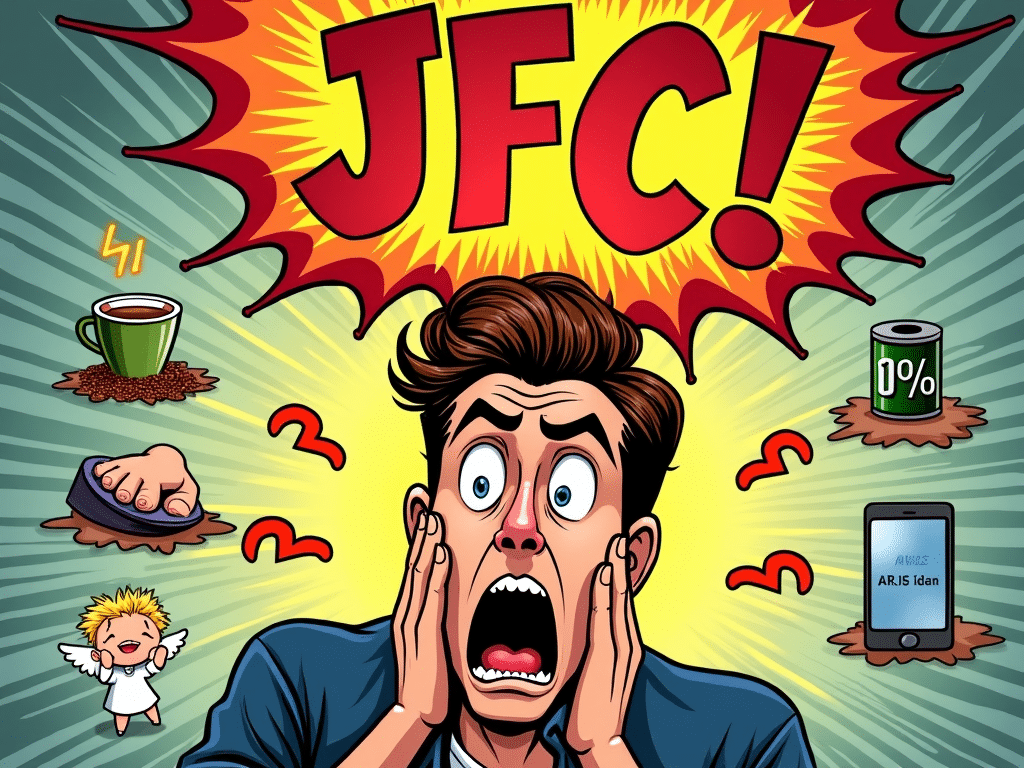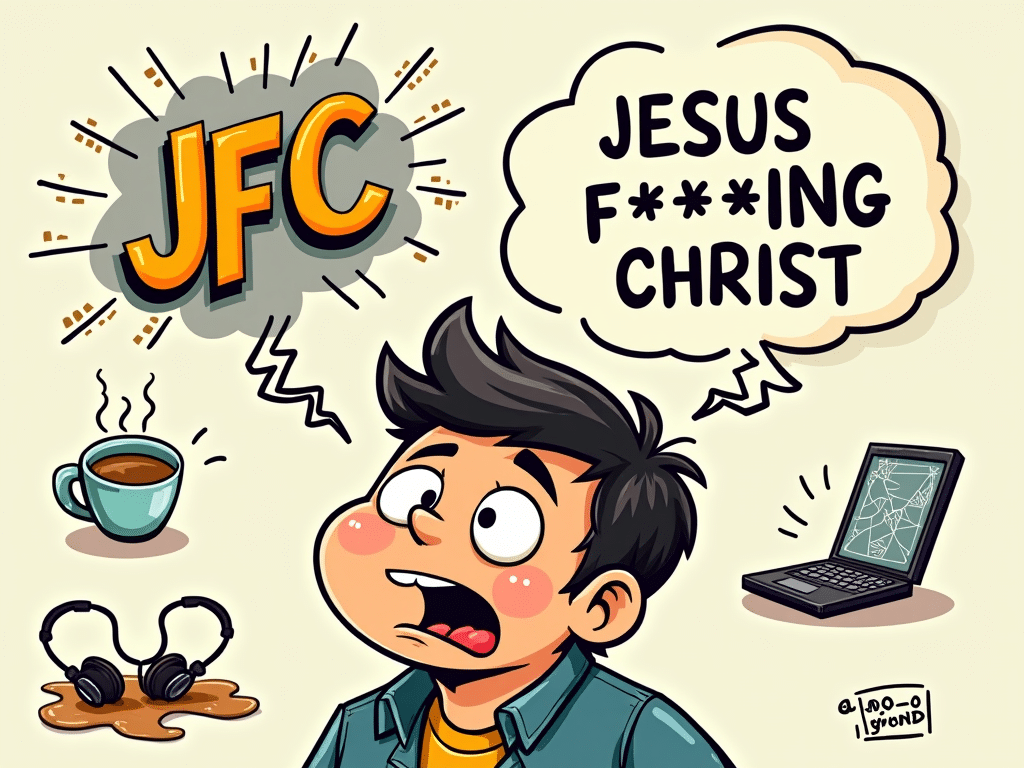What Does JFC Mean? The Internet Slang Explained
"JFC" is an internet slang acronym that stands for "Jesus f*cking Christ." It is an expression of surprise, frustration, or disbelief.
JFC is a versatile acronym that can be used in a variety of contexts. It can be used to express positive or negative emotions, and it can be used in both formal and informal settings. JFC is a popular acronym on social media, and it is also used in text messages and emails.
The origins of JFC are unknown, but it is thought to have originated in the early days of the internet. JFC is one of the many internet acronyms that have become popular in recent years. These acronyms are a way to save time and space when typing, and they can also add a touch of personality to your messages.
Read also:A Titillating Guide To The Enchanting World Of Tickling On Vk
jfc internet slang
JFC is an internet slang acronym that stands for "Jesus f cking Christ." It is an expression of surprise, frustration, or disbelief. JFC is a versatile acronym that can be used in a variety of contexts. It can be used to express positive or negative emotions, and it can be used in both formal and informal settings. JFC is a popular acronym on social media, and it is also used in text messages and emails.
- Acronym: JFC stands for "Jesus fcking Christ."
- Expression: JFC is an expression of surprise, frustration, or disbelief.
- Versatile: JFC can be used in a variety of contexts.
- Positive or negative: JFC can be used to express positive or negative emotions.
- Formal or informal: JFC can be used in both formal and informal settings.
- Popular: JFC is a popular acronym on social media.
- Common: JFC is also used in text messages and emails.
JFC is a useful acronym that can be used to express a variety of emotions. It is a versatile acronym that can be used in a variety of contexts. JFC is a popular acronym on social media, and it is also used in text messages and emails.
1. Acronym
The acronym JFC is a shortened form of the phrase "Jesus fcking Christ." It is a vulgar expression that is used to express surprise, frustration, or disbelief. JFC is a popular acronym on the internet, and it is often used in social media, text messages, and emails.
The acronym JFC is significant because it is a way to express strong emotions in a concise way. It is also a way to add humor or sarcasm to a message. JFC is a versatile acronym that can be used in a variety of contexts.
For example, JFC can be used to express surprise at a news story, frustration at a traffic jam, or disbelief at a friend's story. JFC can also be used to add humor to a message, such as when someone says "JFC, I can't believe I ate the whole pizza."
Understanding the meaning of the acronym JFC is important for understanding internet slang. JFC is a common acronym that is used in a variety of contexts. It is a versatile acronym that can be used to express a range of emotions.
Read also:Discover Creative Ways To Bypass Pixeldrain Limits
2. Expression
The acronym JFC is a shortened form of the phrase "Jesus f*cking Christ." It is a vulgar expression that is used to express surprise, frustration, or disbelief. JFC is a popular acronym on the internet, and it is often used in social media, text messages, and emails.
- Surprise: JFC can be used to express surprise at something unexpected or shocking. For example, someone might say "JFC, I can't believe I won the lottery!"
- Frustration: JFC can also be used to express frustration at something annoying or difficult. For example, someone might say "JFC, I'm so frustrated with this traffic jam!"
- Disbelief: JFC can also be used to express disbelief at something that seems too good to be true or too outrageous to believe. For example, someone might say "JFC, I can't believe he actually did it!"
The expression JFC is a versatile way to express a range of emotions. It is a common acronym that is used in a variety of contexts. Understanding the meaning of JFC is important for understanding internet slang.
3. Versatile
The versatility of JFC is one of the reasons for its popularity. It can be used in a variety of contexts, from casual conversation to more formal settings. For example, JFC can be used to express surprise, frustration, or disbelief in a text message to a friend, or it can be used to add humor to a social media post. JFC can even be used in a more formal setting, such as an email to a colleague, to express frustration with a project or to add emphasis to a point.
The versatility of JFC makes it a useful tool for communicating a variety of emotions and ideas. It is a concise and effective way to express oneself, and it can be used in a variety of contexts. Understanding the versatility of JFC is important for understanding how it is used in internet slang.
Here are some examples of how JFC can be used in different contexts:
- Casual conversation: "JFC, I can't believe I lost my keys again."
- Social media: "JFC, this traffic jam is ridiculous!"
- Formal setting: "JFC, I'm so frustrated with this project."
As these examples show, JFC can be used to express a variety of emotions and ideas. It is a versatile acronym that can be used in a variety of contexts. Understanding the versatility of JFC is important for understanding how it is used in internet slang.
4. Positive or negative
The acronym JFC is a versatile tool that can be used to express a wide range of emotions, both positive and negative. This versatility is one of the reasons for JFC's popularity, as it allows users to communicate their feelings in a concise and effective way.
When used to express positive emotions, JFC can convey a sense of excitement, joy, or relief. For example, someone might say "JFC, I'm so happy!" to express their joy at receiving good news. Alternatively, someone might say "JFC, I'm so relieved!" to express their relief at having avoided a difficult situation.
When used to express negative emotions, JFC can convey a sense of frustration, anger, or disbelief. For example, someone might say "JFC, I'm so frustrated!" to express their frustration at a difficult task. Alternatively, someone might say "JFC, I can't believe this!" to express their disbelief at a shocking event.
The ability of JFC to express both positive and negative emotions makes it a powerful tool for communication. It allows users to convey their feelings in a concise and effective way, regardless of whether those feelings are positive or negative.
Understanding the versatility of JFC is important for understanding how it is used in internet slang. JFC is a versatile acronym that can be used to express a variety of emotions, both positive and negative. This versatility makes it a useful tool for communicating a variety of emotions and ideas.
5. Formal or informal
The acronym JFC is a versatile tool that can be used in both formal and informal settings. This versatility is one of the reasons for JFC's popularity, as it allows users to communicate their feelings in a concise and effective way, regardless of the context.
- Professional settings:
In professional settings, JFC can be used to express frustration or disbelief in a way that is more formal than other, more vulgar expressions. For example, an employee might say "JFC, I can't believe this project is still not finished" to express their frustration with a coworker or deadline.
- Casual settings:
In casual settings, JFC can be used to express a wide range of emotions, both positive and negative. For example, a friend might say "JFC, I'm so happy to see you!" to express their joy at seeing you, or they might say "JFC, I can't believe you did that!" to express their disbelief at something you did.
The ability of JFC to be used in both formal and informal settings makes it a powerful tool for communication. It allows users to convey their feelings in a concise and effective way, regardless of the context.
6. Popular
The popularity of JFC on social media is due to several factors. First, JFC is a concise and effective way to express a range of emotions, from surprise to frustration to disbelief. This versatility makes JFC a useful tool for communicating in a variety of contexts.
Second, JFC is a relatively new acronym, which means that it is not yet overused or clichd. This freshness makes JFC more appealing to users who are looking for a way to express themselves in a unique and creative way.
Finally, JFC is a relatively easy acronym to remember and type. This ease of use makes JFC more likely to be used by users who are not familiar with other internet slang acronyms.
The popularity of JFC on social media has led to its adoption by a wider range of users. JFC is now used in a variety of contexts, from casual conversation to more formal settings. This versatility makes JFC a powerful tool for communication, and it is likely to continue to be popular for years to come.
7. Common
The fact that JFC is commonly used in text messages and emails is a significant aspect of its popularity and widespread adoption. This usage highlights the acronym's versatility and adaptability to different communication platforms.
One of the primary reasons for JFC's popularity in text messages and emails is its conciseness and effectiveness in conveying emotions. The acronym's brevity allows users to express their feelings quickly and efficiently, making it an ideal choice for fast-paced digital communication.
Moreover, the use of JFC in text messages and emails adds a touch of informality and casualness to conversations. This informality aligns with the conversational nature of these communication methods, making JFC a natural fit for expressing emotions in a relatable and engaging way.
In addition, the prevalence of JFC in text messages and emails contributes to its overall recognition and understanding among internet users. The repeated exposure to the acronym in these contexts reinforces its meaning and usage, solidifying its place in the lexicon of internet slang.
Understanding the significance of JFC's usage in text messages and emails is essential for comprehending its role in internet slang. This usage demonstrates the acronym's adaptability, efficiency, and widespread acceptance, contributing to its popularity and cultural relevance.
Frequently Asked Questions About "JFC" Internet Slang
This section addresses some common questions and misconceptions surrounding the internet slang acronym "JFC."
Question 1: What does "JFC" stand for?
Answer: "JFC" is an acronym that stands for "Jesus f*cking Christ." It is a vulgar expression used to convey surprise, frustration, or disbelief.
Question 2: Is it appropriate to use "JFC" in all contexts?
Answer: The use of "JFC" should be considered carefully based on the context and audience. While it may be acceptable in casual conversations among friends, it is generally not suitable for formal or professional settings.
Question 3: What are some alternative ways to express similar sentiments without using "JFC"?
Answer: There are various alternative phrases that can be used to convey surprise, frustration, or disbelief without resorting to vulgarity. Some examples include "Oh my goodness," "Seriously?" or "I can't believe this."
Question 4: Is "JFC" considered offensive?
Answer: The acronym "JFC" may be perceived as offensive by some individuals, particularly those who find religious profanity objectionable. It is important to be mindful of the potential impact of using this acronym on different audiences.
Question 5: What is the origin of "JFC" internet slang?
Answer: The exact origin of "JFC" is unknown, but it is believed to have emerged in the early days of the internet as a way to express strong emotions in a concise and impactful manner.
Question 6: How prevalent is the use of "JFC" online?
Answer: "JFC" is a widely recognized and frequently used acronym in various online spaces, including social media platforms, online forums, and instant messaging applications.
Summary: Understanding the meaning and appropriate usage of "JFC" internet slang is crucial for effective communication online. While it can be a convenient way to express strong emotions, it is important to consider the context and audience before using this acronym to avoid potential misunderstandings or offense.
Transition: This concludes the FAQ section on "JFC" internet slang. For further insights into the evolution and cultural significance of internet slang, please refer to the additional article sections below.
Tips for Using "JFC" Internet Slang
The following tips will help you use the internet slang acronym "JFC" effectively and appropriately:
Tip 1: Understand the Meaning and Origin
Before using "JFC," it is essential to understand its meaning as an acronym for "Jesus f*cking Christ." This vulgar expression conveys strong emotions, typically surprise, frustration, or disbelief. Knowing its origin and connotation will guide your usage appropriately.
Tip 2: Consider the Context
The appropriateness of using "JFC" depends on the context. While it may be acceptable in casual online conversations, it is generally not suitable for formal or professional settings. Be mindful of your audience and the tone you want to convey.
Tip 3: Use Alternatives When Necessary
There are alternative phrases that can express similar sentiments without using vulgarity. Consider using expressions like "Oh my goodness," "Seriously?" or "I can't believe this" when appropriate.
Tip 4: Avoid Overuse
Overusing "JFC" can diminish its impact and make it less effective. Use it sparingly to maintain its potency and avoid desensitizing your audience to its intended meaning.
Tip 5: Respect Different Perspectives
Some individuals may find religious profanity offensive. Be respectful of different perspectives and avoid using "JFC" in situations where it may cause discomfort or misunderstanding.
Summary:
Using "JFC" internet slang effectively requires an understanding of its meaning, consideration of context, and respect for diverse perspectives. By following these tips, you can harness the expressive power of this acronym while maintaining appropriateness and sensitivity in your online communication.
Conclusion
In conclusion, "JFC" has emerged as a prominent internet slang acronym that encapsulates strong emotions, particularly surprise, frustration, and disbelief. Its versatility and adaptability have contributed to its widespread use across various online platforms, from social media to messaging applications.
Understanding the meaning, origin, and appropriate usage of "JFC" is crucial for effective communication in digital spaces. By considering the context, respecting diverse perspectives, and using alternatives when necessary, individuals can harness the expressive power of this acronym while maintaining sensitivity and appropriateness.
As the internet landscape continues to evolve, it is likely that "JFC" and other internet slang terms will continue to play a significant role in shaping online communication. Embracing the nuances and cultural significance of these expressions can enhance our ability to connect, express ourselves, and navigate the ever-changing digital world.
Breaking News: Is Michael J. Fox Still Alive Today?
When Did Billie Eilish Hit The Big Time? A Timeline Of Her Rise To Stardom
The Latest On Will Cain Young [Breaking News]

JFC Meaning » Decode Slang »

JFC Meaning » Decode Slang »

JFC Meaning » Decode Slang »